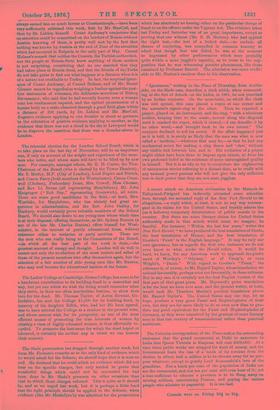A recent attack on American civilisation by the Marquis de
Talleyrand-Perigord has indirectly attracted some attention here, through the animated reply of the New York Herald to its allegations,—a reply which, at least, is not in any way extrava- gant in its claims for the United States, and frankly admits the (as it believes) temporary deterioration of public morals in the country. But there are some literary claims for United States authorship made in that article which must, we imagine, be fanciful. For instance, "Within the last few years," writes the New York Herald, "we have produced the best translation of Dante, the best translation of Homer, and the beat translation of Goethe's Faust' in the English language." It may be only our own ignorance, but as regards the first two instances we do not even know to what works the Herald refers. It would be hard, we fancy, for any American work to approach the poetic merit of Woraley's " Odyssey," or of Carey's, or even Wright's, "Dante." With regard to Goethe's "Faust," the reference is, of course, to Mr. Bayard Taylor, whose translation we noticed favourably, perhaps even too favourably, in these columns. But in any case it is certainly not the best English version of the first part of that great poem. Mr. Hayward's prose translation is far the best we have ever seen, and the present writer, at least, would rank Mr. Theodore Martin's poetical translation above Mr. Bayard Taylor's. The United States may one day, let us hope, produce a very good Faust and Mephistopheles of their own, but they are far more likely to do ao even now than to pro- duce any good equivalent for the Faust and Mephistopheles of Germany, as they were conceived by the greatest of mere literary men in that last century of transcendental rather than practical ambitions.


































 Previous page
Previous page